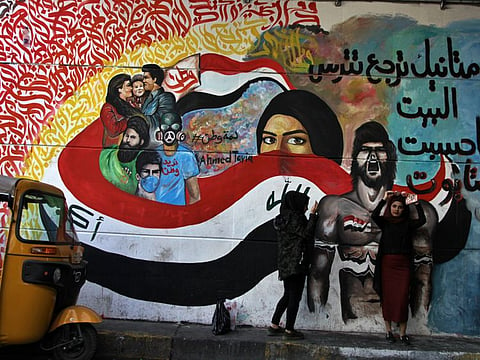Will Iraq’s leaders take protesters’ reform demands seriously?
Parliament is unlikely to adopt reforms that would end the careers of everyone in it

Also In This Package
Baghdad: For 13 weeks, Iraqi protesters have massed in the streets of Baghdad and cities in southern Iraq to demand the ouster of the government, an end to corruption and a halt to the overweening influence of Iran.
And for 13 weeks, the government has foundered in its response, alternating vague promises of reform with brutal treatment of protesters by its security forces.
More than 500 protesters have been killed and 19,000 wounded, according to the United Nations special envoy to Iraq, but the violent response has only deepened protesters’ resolve.
The prime minister, Adel Abdul-Mahdi, has resigned but has remained in a caretaker role, and an Iran-backed candidate, Asaad Al Eidani, has been rejected by protesters.
Iraqi President Barham Salih, threatened to resign, saying he cannot work with a prime minister who is so hated by protesters.
Now there is ambiguity in Iraq over the next step.
The political crisis that now confronts Iraq is as serious as any since the overthrow of Saddam Hussein 16 years ago, and its leaders appear ill-equipped to reckon with it.
No consensus has emerged for a plan to reform the government to meet the protesters’ demands.
“It’s very difficult to find someone who is both broadly acceptable to the street, to the protesters, but who also has the party support, the political support to navigate the transition,” said Maria Fantappie, a senior adviser on Iraq and Syria for the International Crisis Group.
Even if they did, that would hardly begin to address the protesters’ sweeping demands.
“Our goal is not to have Prime Minister Adel Abdul-Mahdi resign,” said Mehdi Chassin, a college student from Amara, in southern Iraq, who came to Baghdad to join the protests.
“That makes no difference because another guy will come who will be just the same. We want them all to go.”
Will politicians dig their own graves?
Of course not. Parliament is unlikely to adopt reforms that would end the careers of everyone in it, and the protesters are unlikely to accept anything less.
“What the parties want is rejected by the Iraqi people and what the Iraqi people want is rejected by the parties,” said Karim al-Nuri, a senior official in the Badr Organization, one of the parties that is close to Iran, but has a diverse membership.
“So there are two alternatives: either to change the Iraqi people or to change some of the political class and make some change in the political process.”
Parliament also seems unprepared to find a way to reduce Iranian influence.
Iranian political and military operatives — including senior figures like Qassim Soleimani, the head of the powerful Quds Force that reports to Iran’s supreme leader, Ayatollah Ali Khamenei — have been in and out of Baghdad trying to ensure that whomever is nominated for prime minister meets Iran’s needs.
Finding someone acceptable to the Iraqi street, to Shiite political parties and to Iran seems “quite insurmountable,” Fantappie said.
So, rather than debate the protesters’ demands directly, members of Parliament talk about how much they are doing — passing legislation to limit salaries of the ministers for instance.
Qais Al-Khazali, the leader of one of the Shiite parliamentary blocs close to Iran, said, “We have enacted legislation, that is our responsibility, now the government’s responsibility is to enforce it.”
How did the protests start?
When the protests started on Oct. 1, many who came to demonstrate in Baghdad and across southern Iraq were demanding jobs and services such as electricity and clean water.
But after the government opened fire on them, killing over 100 in the first five days, the number of protesters multiplied and they began to agitate for more far-reaching changes.
Overhauling the entire system of government seems far from politically possible. But the protesters’ focus reflects their frustration with the government’s failure to foster economic opportunity or deal with entrenched corruption. These grievances unite all of those who have come to the street: the young people, the workers, the poor, the educated and the barely literate, the tribal leaders as well as urban street sweepers.
What is Iran’s role in all this?
In responding to the protests with violence, these forces are taking a page from the Iranian playbook: When Tehran was faced with protests over gas prices in November, it crushed them brutally, killing as many as 450 people in four days and imprisoning 7,000.
While the pace of killings in Iraq has ebbed and flowed, the attacks have become more brutal and there has been an increase in kidnappings, arrests and disappearances of protest leaders, doctors who treat wounded protesters, and journalists.
Human Rights Watch and the United Nations Human Rights Commission have called on the government to halt its lawless crackdown. Human Rights Watch has demanded that the United States and Europe to do more to censure the government.
For those demonstrating, the more comrades they lose, the harder it is to give up, said Haithem al-Mayahi, a protest leader from Karbala, who said he tried for years to work within the political system.
“The protesters lost hundreds of their friends, their brothers, their family members,” he said. “It’s either you fight to win or you die.”




